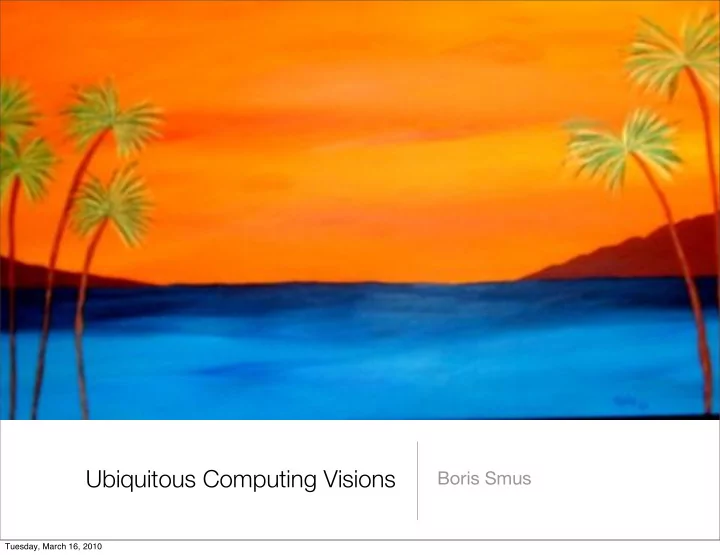

Ubiquitous Computing Visions Boris Smus Tuesday, March 16, 2010
Who cares about vision? ubiquitous computing is unusual amongst technological research arenas how? quote from Genevieve Bell and Paul Dourish Tuesday, March 16, 2010
Structure of the lecture the original vision refinements and criticisms Tuesday, March 16, 2010
History of computing mainframes (many-to-one) personal computing (one to one) Tuesday, March 16, 2010
Mark Weiser father of ubiquitous computing chief scientist at Xerox PARC in the United States had the original ubiquitous computing vision (circa 1991) Tuesday, March 16, 2010
The vision computer computer ubicomp (one-to-many) computer computer computer Tuesday, March 16, 2010
The vision ubicomp (one-to-many) Tuesday, March 16, 2010
What ubiquitous computing is go beyond the traditional user interface integrate into the real physical world small location aware computers, networked invisible Tuesday, March 16, 2010
What ubiquitous computing is not virtual reality ubiquitous computing Tuesday, March 16, 2010
Calm computing one person, many computers sounds stressful Weiser: adding more tech for a better experience Tuesday, March 16, 2010
Tabs, pads and boards basic form factors in ubiquitous computing tabs — PDAs, phones, employee badges, RFIDs, keychains pads — paper, laptops, books boards — video screens, bulletin boards, windows Tuesday, March 16, 2010
Example: Sal’s world a fictional world to better illustrate ubiquitous computing concepts core features from exerpt • everything has a computer built in (intelligent alarm) • the computers are relatively simple (yes and no are the only words) • the computers are networked (alerted by restless sleep) Tuesday, March 16, 2010
Are we there yet? Weiser’s anticipated cross-over: 2005 — 2020 modern computing: one person to several computers we’re still far from Sal’s world hidden computers are everywhere, but not really networked Tuesday, March 16, 2010
Has the vision changed? Tuesday, March 16, 2010
In summary Weiser’s vision is important led to clarity in a futurist-inspired field suggested new research directions Tuesday, March 16, 2010
One more thing Weiser was a drummer in Severe Tire Damage (STD) Tuesday, March 16, 2010
How’s everyone doing? Just checking :) Tuesday, March 16, 2010
Modern ubiquitous computing evolving Mark’s vision Tuesday, March 16, 2010
Criticism #1: the ubicomp vision is too general the research direction needs to change Tuesday, March 16, 2010
Disciplines in ubiquitous computing context-aware computing ambient intelligence tracking and monitoring Tuesday, March 16, 2010
Limited success: BlueEyes research question: How can we make computers "see" and "feel"? “The success of the BlueEyes project, however, was limited; an example of an achievement that is posted on its website is of a television that would turn itself on when a person in the room made eye contact with it. To turn it off, the person could ‘tell’ it to switch off.” -- Yvonne Rogers Tuesday, March 16, 2010
Suggestion: get concrete “improve existing experiences with ubiquitous computing” playing and learning in a mixed physical-virtual space self-monitoring and behavioral change Tuesday, March 16, 2010
Examples (playing and learning) Tuesday, March 16, 2010
Examples (behavioral change) Tuesday, March 16, 2010
Criticism #2: calm computing is a pipe dream and ubicomp is already here Tuesday, March 16, 2010
Singapore SMS to hail cabs, 95% of population owns a cell distributed poll road pricing high internet penetration Tuesday, March 16, 2010
Singapore is not calm, says Genevieve Bell Tuesday, March 16, 2010
Criticism #3: ubicomp has a negative social impact ubicomp encourages complacency and spawns privacy issues Tuesday, March 16, 2010
Privacy issues ubicomp: a lot of computers are always watching what if someone malicious manages to get access to the computers in our sphere? how would we know? privacy issues of today are compounded Tuesday, March 16, 2010
Sal’s world? do we want to live there? too much computer dependency already do we want more? comparison to Victorian England Tuesday, March 16, 2010
Criticism #4: ubicomp is retro-futurism why don’t we have ubicomp yet? Tuesday, March 16, 2010
this is retro-futurism Tuesday, March 16, 2010
Bell asks some tough questions twenty years after Weiser and 10,000 times the computing power later... 1. why is our vision still the same as Weiser’s? 2. why isn’t ubicomp here yet? Tuesday, March 16, 2010
ubicomp? maybe ubicomp is inherently unattainable? Tuesday, March 16, 2010
questions? thanks for listening Tuesday, March 16, 2010
Recommend
More recommend